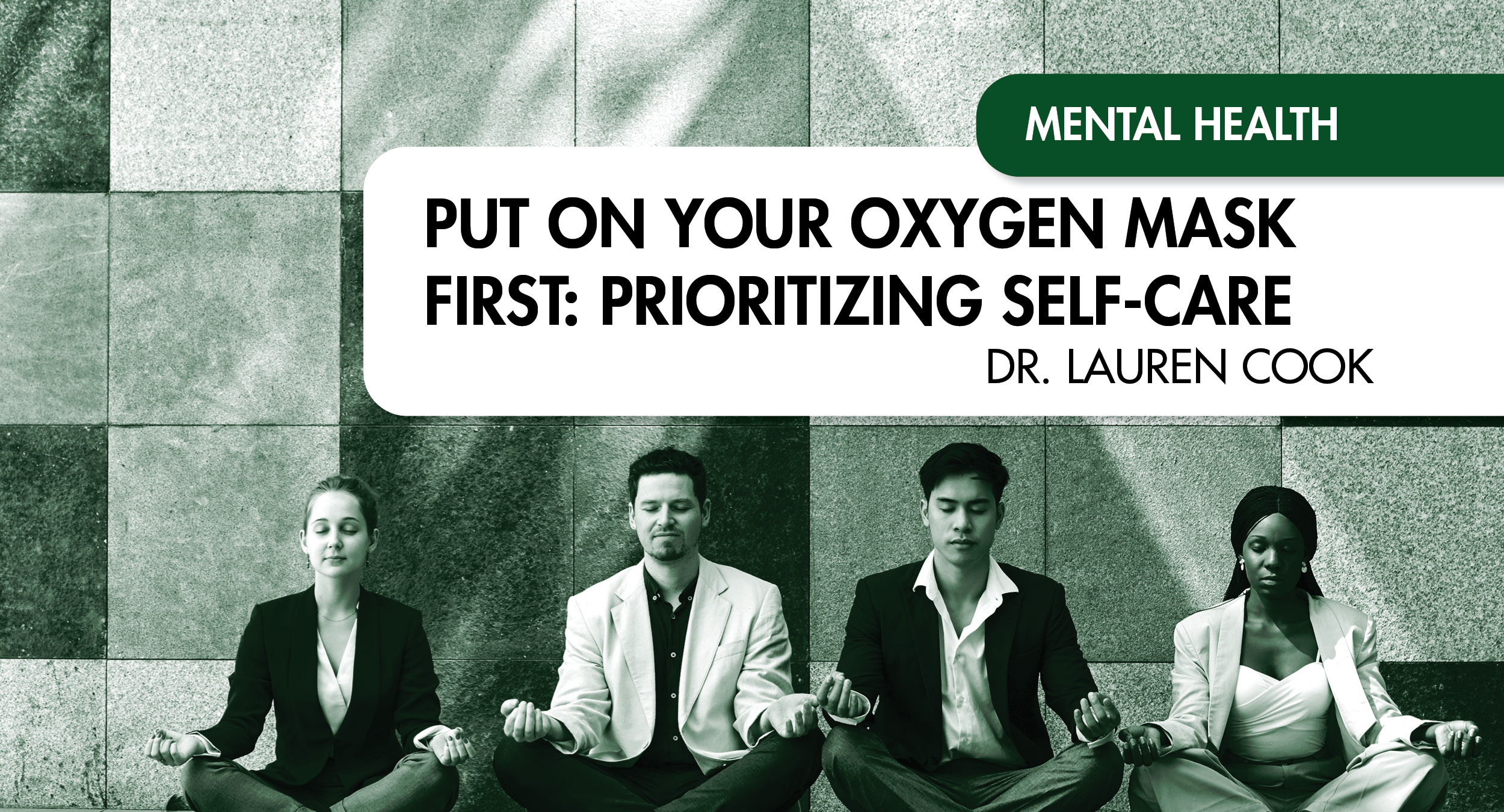
Put On Your Oxygen Mask First: Prioritizing Self-Care
It’s the beginning of a new year. Are you already feeling stressed out? We tend to be that much harder on ourselves and the start of a new year can feel even more overwhelming. When the workload has got you down, one of the best things you can do is take preventative steps to protect your wellbeing.
Simply put, we call this self-care. What is self-care?
I like to envision it like this: have you noticed that when you’re preparing to takeoff in an airplane the flight attendant demonstrates how to use the oxygen mask? They always say to put your own oxygen mask on first before helping someone else. This is exactly how self-care works. We need to invest in our well-being before we can help others.

Self-care includes anything that you love to do. What makes you feel recharged, well-rested, and happy? I especially love how Dr. Mihaly Csikszentmihalyi conceptualizes self-care with the notion of “flow.” Flow is the optimal state when we are so in the moment that we lose track of time.[i] The activity is so emotionally stimulating and engaging that we don’t care what other priorities we have on our list.
And if you’re not sure what you love to do or when you are in “flow?” Follow your natural curiosity and talent and see what you find. Be willing to experiment with your creativity and be open to new experiences.
What are some different things that you can do for self-care? I’m listing a plethora of options for you below.
Self-Care Set
Hold, walk, or play with your pet ~ Go for a bike ride ~ Sing in the car ~ Visit the water ~ Let go of something ~ Drink something warm ~ Be alone ~ Watch a funny video ~ Eat dessert ~ Travel to a new country ~ Unplug from your phone ~ Talk a walk ~ Plant something ~ Take a bath ~ Cook a delicious meal ~ Take a nap ~ Spend time with loved ones ~ Read a book ~ Lose track of time ~ Forgive yourself ~ Visit a Farmer’s Market ~ Learn something new ~ Try a new hobby ~ Create something
~
Watch a movie ~ Meet someone that inspires you ~ Organize your space ~
Watch a sunset ~ Give and get hugs ~ Write in a journal ~ Meet with a therapist ~ Wander around town ~ Meditate ~ Write a sincere note to someone ~ Get a massage ~ Call a friend ~ Speak kindly to others ~ Engage in small acts of kindness ~ Go for a hike
~
Sit outside ~ Light a candle ~ Take a yoga class ~ Dance ~ Drive somewhere unknown ~ Bake a treat you love ~ Visit a park ~ Paint a picture ~ Go for a run ~ Watch a show ~ Write a poem~ Buy some flowers ~ Practice gratitude ~ Watch the clouds ~ Stretch ~
Watch some Netflix ~ Sit in the sun ~ Wear an outfit that you feel great in ~
Cuddle up in a blanket ~ Decorate your space ~ Watch sports ~ Breathe fresh air ~ Pray ~ Chat with a friend ~ Drink plenty of water ~ Listen to a podcast ~ Do a crossword puzzle ~ Work on a puzzle ~ Play Sudoku ~ Spend time with kids ~ Volunteer ~ Go shopping ~ Plan a vacation ~ Go swimming ~ Play an instrument ~ Sleep in ~ Visit family ~
Celebrate important milestones ~ Laugh ~ Step away from work ~ Go to a comedy show ~ Use a coloring book ~ Knit ~ Visit an art museum ~ Go to a concert ~ Play on Pinterest ~ Sleep eight hours ~ Play video games ~ Plant a garden ~ Clean your space
~
Join an intramural team ~ Visit a spiritual place ~ Clean out your inbox ~ Get a haircut ~
Build something ~ Make your bed ~ Sit by a fireplace ~ Compliment someone ~ Give someone a gift ~ Do what you loved as a kid ~ Listen to the sounds of nature
Self-care is a commitment. It’s easy to say that you will start adding these different ideas to your routine but if you don’t create a plan, it won’t happen. You need to be proactive with your self-care and actually pencil it in your schedule, just as you would with work deadlines.
My recommendation is that you pick at least one self-care item per day each week. If you’re smart with your planning, you can incorporate multiple things that you love into one activity. Therefore, a self-care schedule for the week might look like this:
Monday: Take a yoga class. Drink plenty of water afterwards.
Tuesday: Watch a movie with friends after grabbing dinner together.
Wednesday: Listen to a Ted Talk while getting ready for the day. Cook dinner with a roommate or partner.
Thursday: Go for a hike after work with a colleague.
Friday: Watch the football game. Pick out some fresh flowers when you go to the grocery store. Wear a favorite outfit that you feel confident in.
Saturday: Sleep in and have an amazing breakfast. Go window shopping or play video games for an hour.
Sunday: Play a board game with the family. Listen to your favorite playlist then read a new book.
Many people think self-care is simple and some even scoff at why we “waste time” talking about it. Well, if everyone were so great at it, then we wouldn’t need to take the time to talk about self-care. But clearly, people are not prioritizing their mental and physical health and they develop short and long-term problems as a result.
In fact, those who are burdened by anxiety and stress have a decreased capacity to remember information in their long-term memory and thus have a harder time on their work, even if they performed well during the year.[ii] If we’re not careful, negative experiences like these can build up and it can make it easier for depression to surface.
We have to be intentional about our wellbeing. Tough circumstances are bound to be a part of our life so we have to come back with self-care that much harder. For every negative experience we have, we need to have at least three positive experiences to make up for it.[iii]
It’s clear that self-care is the secret for not only having wellbeing today but for years to come. It’s best to develop the habit of practicing self-care now rather than putting it off for later.
But remember to give yourself grace as you learn the art of wellbeing. Many people engage in all or nothing thinking when it comes to daily self-care. They either work tirelessly and never give themselves a break or they veg out all day (or week) and are unable to accomplish anything. The trick is finding that sweet spot where you are still able to complete assignments and finish tasks while still having some fun. Some days it
will be easier to find this sense of balance but when you do have an off-balance day, remember that you can always have a fresh start tomorrow.
Once you start getting in the habit of self-care, you’ll see how much fun it is. You’ll quickly see the benefits, and not only will you begin to feel happier, the people around you will feel more positive as well.
Our emotions are contagious and that works in either direction. When you are stressed, you’re more likely to snap at others, complain, and just be generally unpleasant. This permeates to others and they either will start to avoid you or join in with the whining. But if you are feeling well-rested, you’re more likely to meet the day with optimism, kindness, and a can-do mentality. Others will gravitate towards your goodwill and they
will feel better just by being around you. So here’s to a well-rested start to the year—this is your year to find your joy.
[i] Csikszentmihalyi, M. (1996). Flow and the psychology of discovery and
invention. New York: Harper Collins.
[ii] Hawn, G., & Holden, W. (2011). 10 Mindful Minutes: Giving Our Children–and Ourselves–the Social and Emotional Skills to Reduce Stress and Anxiety for Healthier, Happy Lives. Penguin.
[iii] Fredrickson, B. L., & Kurtz, L. E. (2011). Cultivating positive emotions to enhance human flourishing. Applied positive psychology: Improving everyday life, health, schools, work, and society, 35-47.
